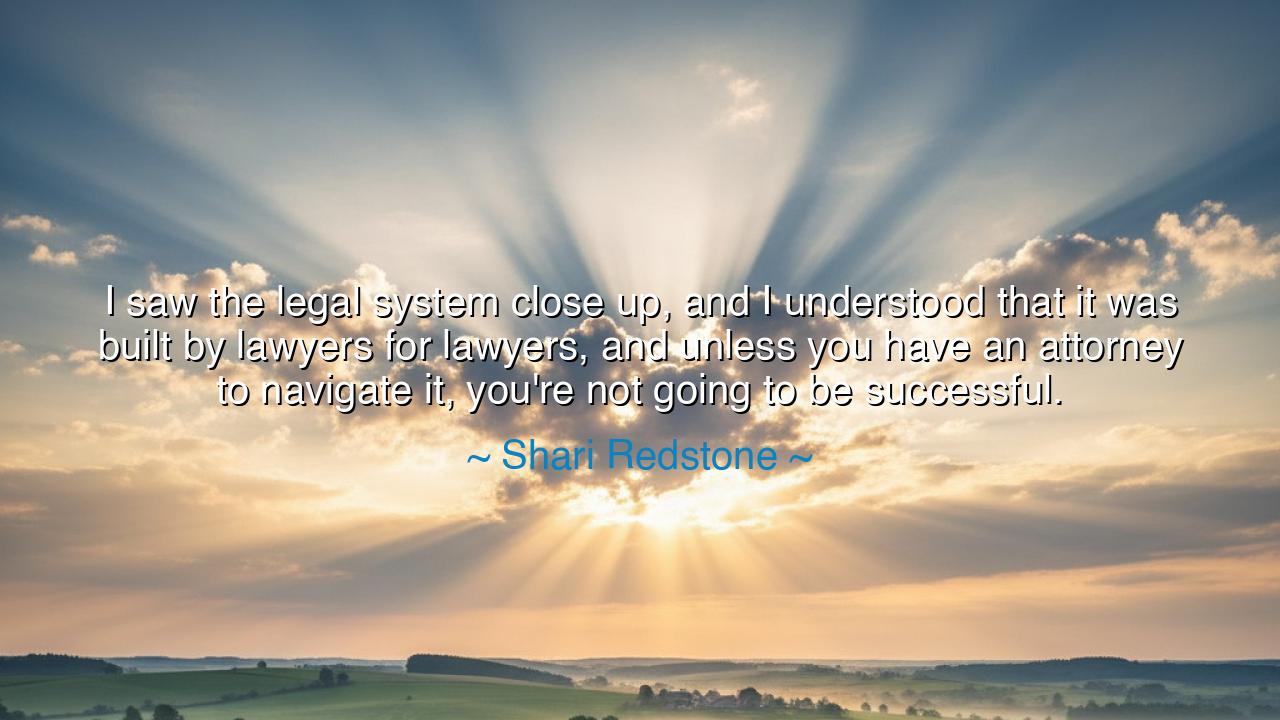
I saw the legal system close up, and I understood that it was
I saw the legal system close up, and I understood that it was built by lawyers for lawyers, and unless you have an attorney to navigate it, you're not going to be successful.






The words of Shari Redstone strike with both clarity and lament: “I saw the legal system close up, and I understood that it was built by lawyers for lawyers, and unless you have an attorney to navigate it, you're not going to be successful.” Within these words lies not bitterness, but revelation — the realization that the legal system, though born from noble ideals, has grown into a labyrinth of complexity that often confounds those it was meant to protect. Her insight is not a mere observation of structure, but a profound reflection on power, access, and the hidden walls that divide those who know the law from those who merely live under it.
In the ancient world, law was seen as the voice of the gods — carved upon stone tablets or proclaimed in the agora. But over time, as civilization grew more intricate, so too did its laws. The scribes and magistrates became gatekeepers of knowledge, and their wisdom, once meant to guard justice, became its barrier. What Redstone saw in her close encounter with the legal realm is the same truth that haunted philosophers since the dawn of governance: when the language of justice becomes too obscure for the common person to understand, justice itself becomes the privilege of the few.
Her words echo like an old warning. A system “built by lawyers for lawyers” is one that serves itself before it serves the people. The law, wrapped in its scrolls of precedent and its rituals of language, becomes a fortress of intellect rather than a bridge of fairness. It was not always so. The dream of law was once to bring order to chaos, to give voice to the voiceless. Yet, when the power to interpret law belongs only to those who profit from it, the dream begins to decay. The law ceases to be the servant of the citizen and becomes instead the master of their fate.
History bears witness to this transformation. In the late Roman Republic, as laws multiplied and contradictions grew, only the educated elite — the jurisconsults — could truly comprehend them. Ordinary citizens, unable to navigate the labyrinth of decrees, were forced to rely on advocates who spoke in their stead. The gap between justice and the people widened, and the empire’s moral core weakened. The same danger lies in the modern age: when the legal system becomes a maze that only specialists can traverse, truth becomes a matter of expertise rather than conscience.
Yet, Redstone’s observation is not a condemnation of lawyers, but a call to awareness. She reveals the imbalance not to despair, but to inspire reform. The attorney — the one trained to navigate the storm — remains essential, but the true test of a society lies in whether it can make justice accessible to all. For every person denied justice because they could not afford counsel, the law loses a fragment of its legitimacy. As ancient sages once taught, “Where there is no justice for the poor, there is no peace for the rich.” The system thrives not when it protects its own, but when it empowers those without voice or title.
In this truth lies a lesson for every generation: knowledge must never become a tool of exclusion. The law should be written not merely in books, but in the hearts of the people. If the law serves only those who can pay for guidance, it ceases to be the law of the people and becomes instead an instrument of hierarchy. Thus, it falls upon the wise — lawmakers, educators, reformers — to simplify, to clarify, and to bring the light of understanding where obscurity has long prevailed.
Let those who hear these words remember this: justice that cannot be understood cannot be trusted. Seek knowledge, not only for yourself but for those who cannot reach it. Advocate for transparency, for fairness, for systems that empower rather than intimidate. And when you see a fellow traveler lost in the corridors of bureaucracy or the language of law, do not turn away. Be their guide. For every act that makes justice clearer brings humanity one step closer to the vision our ancestors once dreamed — a world where the law serves the living, not the learned.
So let the wisdom of Shari Redstone endure as both warning and light: that in every age, we must rebuild the path to justice, so that it may once again belong not to the lawyers, but to the people. For when the law is truly understood by all, then, and only then, will it fulfill its highest purpose — to be not a maze of power, but a mirror of truth.






AAdministratorAdministrator
Welcome, honored guests. Please leave a comment, we will respond soon